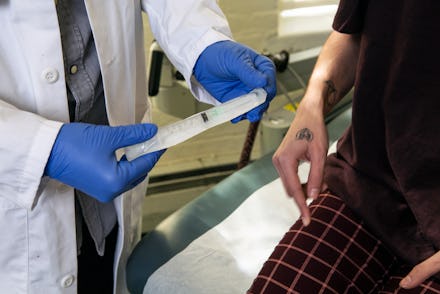Trans people have endured years of medical ignorance. This company wants to change that

Queer and transgender people in the U.S. face extraordinary healthcare challenges. Some of these challenges are rooted in mainstream medical ignorance of some of the unique kinds of care that trans people need, such as hormone replacement therapy (HRT). But many of the hurdles queer, transgender, and gender non-conforming (TGNC) people face are based in structural bias and discrimination about who they are. A new company, Folx, is revolutionizing healthcare for queer and transgender people — and maybe everyone else too.
According to recent surveys done by the National Center for Transgender Equality, a third of trans people said that they had had a negative experience when they went to the doctor and almost a quarter of trans people didn’t go to the doctor when they needed to because they feared discrimination and violence. Many young trans people have also had to resort to risky ways of accessing “grey market” hormones.
Also, imagine that you are sick with, say, COVID-19 and you are more scared of what may happen if you seek treatment than you are of the disease. Let that sink in.
Thankfully, A.G. Breitenstein, founder of the new queer and trans healthcare provider Folx, saw the need for a revolutionary new approach and stepped up. “Trans people are treated as pathologies in medical settings,” Breitenstein tells me. This is a bias with structural roots. “Gender identity disorder” was considered a mental illness diagnosis until 2013, and “transexualism” wasn’t removed from the World Health Organization’s disease manual until 2018.
Breitenstein wanted to change the dehumanizing experience that trans people have in medical settings, and she also wanted to give TGNC people access to medical care that actually understands our needs. “The medical mainstream does not know how to care for this community,” she says. “There is a lack of basic literacy about what people need.” That’s where Folx is stepping in.
Here’s how it works: Folx is a membership-based digital healthcare platform. Members receive tailored services that include gender-affirming hormone therapy (HRT); erectile dysfunction (ED); PrEP (Pre-Exposure Prophylaxis for HIV); and STI testing. Folx starts at $59 per month and goes up from there, depending on the type of medications and therapy obtained.
Also, Folx operates outside of your insurance, if you have it. The reality is that a staggering percentage of TGNC people (and to be fair, Americans in general) don’t have insurance and even if they do, some of these services aren’t covered and they end up paying out-of-pocket anyways.
Folx is giving more TGNC people access to services they already need, but it’s also offering them in a totally new way. “We are trying to change the power structure,” Breitenstein says, “At Folx, we want people to know that they can be and do what they want and we’re not trying to put them in another box.” Breitenstein says that she wants medical care to be caring and even fun for trans people.
Though Folx just launched, it’s a breath of fresh air for its pioneering users. “I’ve never felt so understood,” Ray Peace, a 28-year-old freelancer in Sarasota tells me. Peace is a trans man who was looking for HRT resources when he came across Folx. “I didn’t know if I wanted to go to a doctor or back to Planned Parenthood, where I’ve had only okay experiences,” he says.
In fact, Peace seemed downright overjoyed about the experience he’s having with Folx. Other medical providers had only offered him HRT by way of injection, which gives some users a rollercoaster of an energetic and emotional experience. Peace says that the clinicians at Folx — many of whom are queer or trans themselves — conferred with him and patiently explained his different treatment options. “I didn’t even know that gel was an option,” Peace says. The gel, it turned out, was a better choice for him. He says it keeps him “on an even base” that makes his HRT process easier.
Turning this very traditional doctor-patient power structure upside down in order to give people a sense of agency is what Folx is aiming for. Peace says he feels really cared for. “We want to represent hope,” Breitenstein says. “We want everybody to be able to feel like they have control over their own lives and bodies.” And that, my friends, is a revolutionary statement in healthcare, not just for queer and TGNC people, but for everyone.